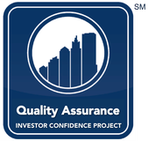| The ICP Technical Team hosted a Technical Forum call (you can catch it HERE), to discuss what it means to be a Quality Assurance (QA) Provider, what the ICP should require, as well as what requirements the ICP QA Provider Credential should include. The ICP Team will be hosting subsequent discussions on Feb 9th and Feb 27th at 11 am EST to continue these discussions, and develop "version 1.0" of this ICP QA Provider Credential, tentatively set for release and incorporation into the ICP Credentialing system by the end of March. |
The following are highlights from the discussions:
- The ICP QA Provider must ensure that a project was developed according to the ICP Energy Performance Protocols leveraging the ICP Project Development Specification and the QA Checklist. And, the QA Provider must check that methodologies, assumptions and results follow best practices and are reasonable.
- The risk associated with a project or a measure drives the level of review detail necessary. The QA effort is all about risk mitigation.
- The QA provider experience is key. If the credentialed project developer (PD) follows ICP, it will reduce review time. Standardization plays a big part in the efficiency and effectiveness of the review process.
- Projects are complex - the review process is difficult to define discretely. Reviewer's experience is paramount in the process.
- Many investors already require a PE; for the QA provider, ICP wants to establish a higher bar than PD. The PE license is important for QA. However, being a PE does not mean they know about energy efficiency (EE) projects. And, PE’s are more experienced but more expensive. Some large firms have lots of experience but not necessarily PE's on staff. But consensus is that the review process must be performed with oversight from a PE, however the work itself can be done by other staff, ideally with specific certifications pertaining to the areas of the project they are reviewing (CEM, BEMP, CMVP, etc.).
- Make it clear that this review process should involve the PE overseeing the work, with others performing the actual review (those that have specialized skills for different EE project components)
- Review associated with programs in NY, MA, NJ, CT - None of these programs require that the review is performed by a PE, but they require that it is performed with oversight by a PE (or registered architect)
- Should the stamp be required? Some investors do require this. Without this requirement, many investors may push back - there is little risk associated with doing a review on the reviewer's part.
- Is "signing off" by the PE enough, and how does this really differ from a PE stamp? - The QA provider is not saying that the project will perform.
- Require five years of QA experience rather than PD experience? Maybe 5 years relevant EE PD experience, and 3 years QA experience?
- Should ICP require certifications for the different components of an EE project review? Energy modeling, M&V, Cx, etc? This may be too restrictive, as some certifications, such as energy modeling for example, are still not well established in the industry.
- Should there be difference requirements for targeted projects versus larger, more comprehensive projects?
- PE STAMP:
- For the public, the seal constitutes the distinctive mark of the professional engineer. It must be used to identify all work prepared by, or under the direct supervision of, a professional engineer as part of professional engineering services rendered to the public. It assures the document’s recipient that the work meets the standards of professionalism expected of competent, experienced individuals who take personal responsibility for their judgments and decisions. The seal is important because it is a visible commitment to the standards of the profession and signifies to the public that a particular P.Eng. accepted professional responsibility for the document. Affixing the seal to a document is a statement by a professional engineer to others that they can, with a high degree of confidence, depend upon the contents of the document for the furtherance of their projects. Since the outcome of a project depends on factors beyond the control of an engineer, however, a successful outcome cannot be guaranteed by an engineer. The seal is not, and should not be considered, a certification mark or warranty of correctness. According to the Supreme Court (Edgeworth Construction Ltd. v. N. D. Lea & Associates Ltd.), the “seal attests that a qualified engineer prepared the document. It is not a guarantee of accuracy”. Instead, it should be considered a “mark of reliance”, an indication that others can rely on the fact that the opinions, judgments, or designs in the sealed documents were provided by a professional engineer held to high standards of knowledge, skill and ethical conduct.
- Suggestion of how to define the QA Provider requirements:
- Can be an individual, an independent firm, or a program
- Must be a PE (if an individual) or have a PE on staff to oversee and approve all review efforts (if a firm)
- Minimum of five years of relevant energy efficiency project development experience, and three years quality assurance review experience, documented in the form of a CV outlining relevant project experiences
- Must attend the ICP Credentialed Project Developer training
- Must complete the ICP Credentialed Quality Assurance Provider training
- Primary responsibilities include:
- Ensure that the project was developed according to the ICP Energy Performance Protocols leveraging the ICP Project Development Specification and QA Checklist
- Check that methodologies, assumptions and results follow best practices and are reasonable




 RSS Feed
RSS Feed